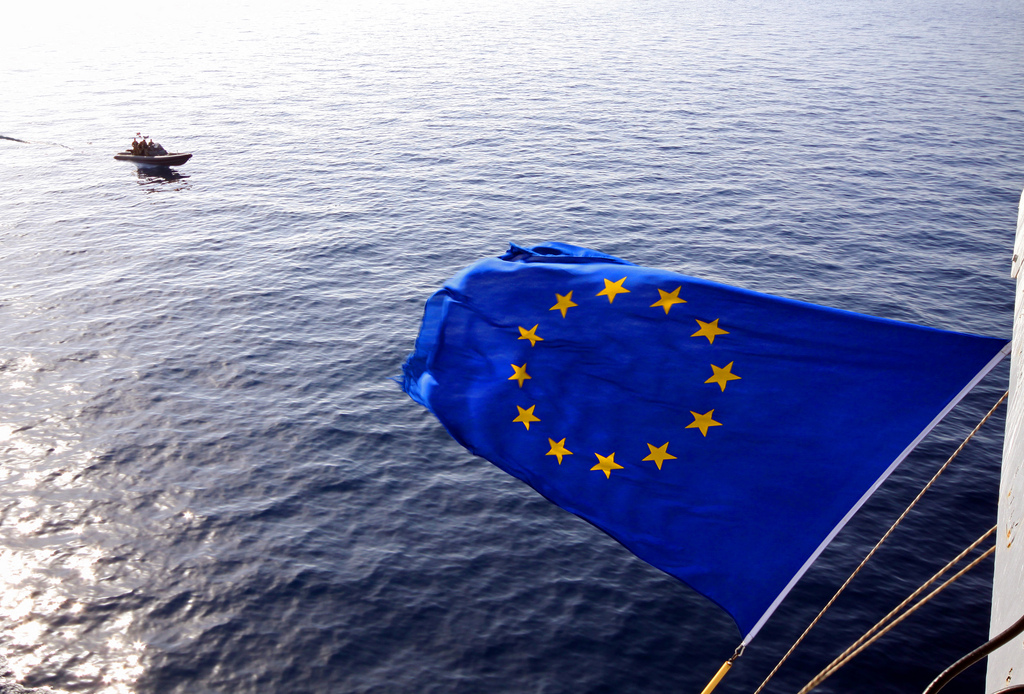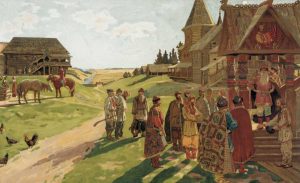
Views: 2291
When Napoleon crossed the Neman River and said about Russia, “May its fate come to pass”, could we call it aggression on Russia by a nineteenth-century European Union? Whatever you call it, with the exception of the Balkans, which were under the Turks, all the rest of Europe had been pulled into this campaign—Prussia, Austria, and Switzerland as allies, and Poland, Spain, and Italy as vassals. That leaves almost no one else. Of course, when writing about history you can’t use modern terminology in the past tense. But a polemicist can do what a scholar cannot. And understanding the conditional nature of what I have said, I will say nonetheless that the Napoleonic campaign was a campaign by the European Union of the time. Then, it was not united by a common market of labor force and capital but by a genius who had crawled out of the revolution like an asp out of the fire; a genius in whom many saw if not the antichrist himself, then at least his forerunner.
 Of course, today’s European Union came into being when it came into being, and not one year earlier. It came into being after the Second World War on the basis of a European union of coal and steel. The side-aim, besides money, is to unite the European industrial elite for their mutual profit, so that they would no longer have to war with each other. It is a matter of the elites and super-profits from large industries. If they tell you another fairy tale about small and medium business and the rights of the “little” man, don’t melt like sugar in tea. Remember: first comes fossil fuels, then smelting and rolling metal and other industrial joys that are far from glamorous. Only after these come hairdressers, make-up artists, interior designers, television entertainment, and veterinarians for house pets. Such is the logic of economics. If there are factories there will be shopping malls, bars, and daycare centers. If you don’t have the first you won’t have the rest—despite the song and dance about budgetary increases and civil rights. Just forget it.
Of course, today’s European Union came into being when it came into being, and not one year earlier. It came into being after the Second World War on the basis of a European union of coal and steel. The side-aim, besides money, is to unite the European industrial elite for their mutual profit, so that they would no longer have to war with each other. It is a matter of the elites and super-profits from large industries. If they tell you another fairy tale about small and medium business and the rights of the “little” man, don’t melt like sugar in tea. Remember: first comes fossil fuels, then smelting and rolling metal and other industrial joys that are far from glamorous. Only after these come hairdressers, make-up artists, interior designers, television entertainment, and veterinarians for house pets. Such is the logic of economics. If there are factories there will be shopping malls, bars, and daycare centers. If you don’t have the first you won’t have the rest—despite the song and dance about budgetary increases and civil rights. Just forget it.
Incidentally, the current European Union, and not the Napoleonic one, does just that. It sings songs about the middle and small businesses, but at the same time strangles local industry in the countries where it spreads its influence. It buys up the banking sector, destroys industry, corrupts people with consumer credit, and weans people away from the labor they have always done. Until only recently the EU was still softly yet unrelentingly instilling its vassals with new morals that cultured people have always talked about only in whispers. That’s how the European Union is. And if Napoleon was the forerunner of antichrist, then he was in fact just a kid compared to this colorless gang of grey bureaucrats, who sing songs about equality while they clear the road for satan.
But I would like to leap in thought to a time even more distant that Kutuzov or Bonaparte. I would like to go back to the sixteenth century—more precisely, to 1596. This was the year of the Brest Unia. Back to those blessed days when Europeans were not required to accept same-sex unions as marriages. What?! They themselves made everyone downright against it. Europeans awoke to the ringing of cathedral bells, listened attentively to every word of the papal encyclicals, and could never imagine how anyone could live as a couple without being officially married in church. They were not interested in factories because there were no factories. Wealth was measured by quantity and quality of lands and the ability of the subjects on those lands for work. Paradise and hell were realities. Life was hard, dirty, short, but exceedingly interesting. True power in those days was found in the sphere of ideology. And ideology in that blessed sixteenth century was religious to the core.
Thus, sixteenth century Catholic Europe with its center in Rome (more exactly, in the Vatican) offered eastern Slavs a union (unia, in Latin) and said, “Accept our faith, for we are higher than you. Without us and our faith you will not save your souls. Without us you will be slaves and swineherds. But with us, you will be just as dignified as we are, and you will enter into Paradise even before you die. Accept our faith and submit to us voluntarily. If not, then we will force you to do so, for your own good; because God through our Pope has given us the right to do this.”
This was the European Union of the sixteenth century. No coal, nor steel, nor LGBT, nor consumer credits—only the same arrogance of a colonizer with regard to aborigines; and the same pride and impenitence. Essentially it is satanism hidden under the mask of Christianity; and today tired satanism hides under the mask of liberal philanthropy. Our uneducated ancestors were deprived of neither wisdom nor natural intuition, nor of a sense of dignity. In answer to offers of such unions they rolled up their sleeves and prepared for a fight. That is how it was in that blessed sixteenth century, which flowed evenly into the blessed seventeenth century, taking its unresolved questions along with it. As a whole, the idea of the Unia suffered defeat. But not right away and not everywhere. It managed to infect a part of the previously healthy body. The Unia gained strength in western Ukraine and partially in western Belorussia. In these regions a phenomenon was born: Eastern faith with a sprinkling of Western rites and obedience to Rome; or, to the contrary, Western faith with Eastern rites. No one can figure out which is more correct.
After several centuries people can get used to any mistake, or come to love any distortion. But objectively speaking, the nature of this distortion does not change. It only grows into the consciousness of those who are used to it. However, the threat it carries has not gone anywhere.
 It only remains to say a bit in conclusion. In the twenty-first century we have run up against a problem with roots reaching back to the late sixteenth century. The Unia, which has torn the Ukraine apart more than once in history and led to the partition of Poland, has not lost its negative charge. The Unia is at the heart of all of the Ukraine’s historical problems. As its entire past and even more so contemporary history has shown, it is capable not only of causing quarrels, but also of enraging and arming, of lightly finding enemies in the person of blood brothers and sanctioning bloodshed. In word it is all for European tolerance, but in deed it advocates “Kristallnacht”; in words it’s for love without barriers, but in deed, for nazification with all the proceeding consequences. It may be hard for people to understand how a religious movement that goes back to over 400 hundred years ago can influence things today more strongly that the dollar exchange rate or the cost of oil. But it’s true. The mistakes of theologians can be very costly. The whole russophobic history of modern Ukraine, and all hatred for Orthodoxy grew out of the Unia, out of that early model of European unity, which has managed to seize a bridgehead in the Eastern Slavic world.
It only remains to say a bit in conclusion. In the twenty-first century we have run up against a problem with roots reaching back to the late sixteenth century. The Unia, which has torn the Ukraine apart more than once in history and led to the partition of Poland, has not lost its negative charge. The Unia is at the heart of all of the Ukraine’s historical problems. As its entire past and even more so contemporary history has shown, it is capable not only of causing quarrels, but also of enraging and arming, of lightly finding enemies in the person of blood brothers and sanctioning bloodshed. In word it is all for European tolerance, but in deed it advocates “Kristallnacht”; in words it’s for love without barriers, but in deed, for nazification with all the proceeding consequences. It may be hard for people to understand how a religious movement that goes back to over 400 hundred years ago can influence things today more strongly that the dollar exchange rate or the cost of oil. But it’s true. The mistakes of theologians can be very costly. The whole russophobic history of modern Ukraine, and all hatred for Orthodoxy grew out of the Unia, out of that early model of European unity, which has managed to seize a bridgehead in the Eastern Slavic world.
In general, don’t look at history superficially. Do not think that money decides everything or that everything can be explained by personal gain. History is more complicated, and man is more mysterious. If heresy entered the soul of larger or smaller societies, then people possessed by this heresy will act even against their own material interests and against their own reason. They will bring to pass a kind of suicidal scenario, because heresy is, in fact, spiritual death. Amidst all of their senseless dying people will create heroic epics and sing songs about the beauty of death for the sake of freedom. This will hardly help them. But the saddest thing is that it is impossible to convince them otherwise.
And here is the last thought for today. We can benefit from watching the latest world news only if we have a more or less serious knowledge of world history and are generally informed in theology. Otherwise, we are doing nothing other than volunteering our own consciousness to someone else for manipulation.
Originally published on 2018-04-22
Author: Fr. Andrey Tkachev
Source: Oriental Review
Origins of images: Facebook, Twitter, Wikimedia, Wikipedia, Flickr, Google, Imageinjection, Public Domain & Pinterest.
Read our Disclaimer/Legal Statement!
Donate to Support Us
We would like to ask you to consider a small donation to help our team keep working. We accept no advertising and rely only on you, our readers, to keep us digging the truth on history, global politics, and international relations.
FOLLOW US ON OUR SOCIAL PLATFORMS









